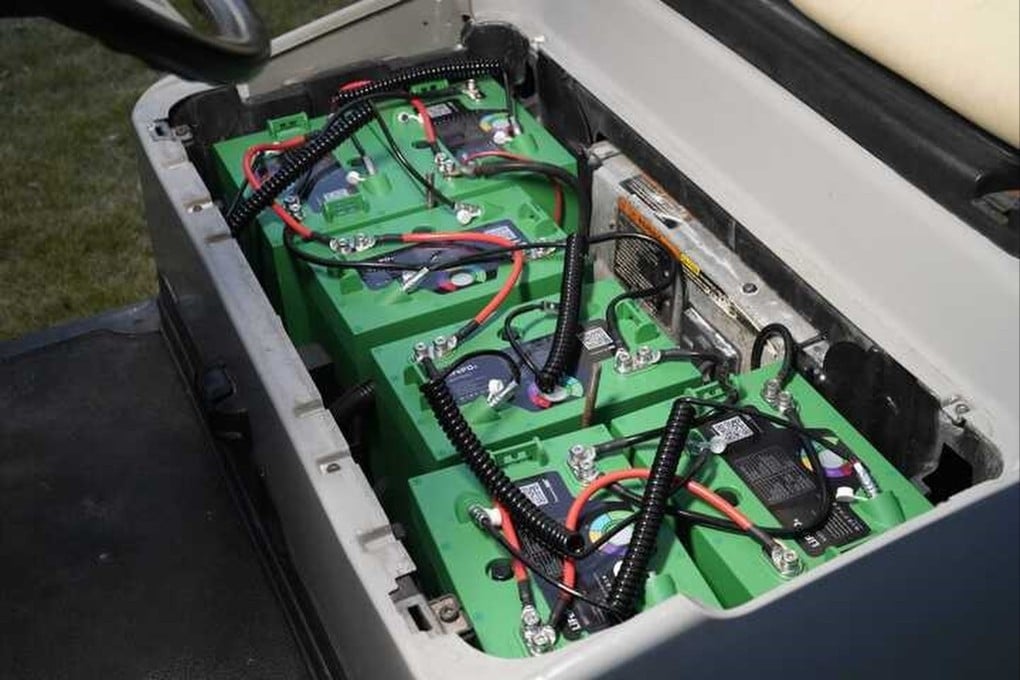-
Shopping Tools
-
Care & Maintenance
-
About
-
Dealer Login

While deep-cycle marine batteries can be used in golf carts, they are not the best choice. Marine batteries are designed for a different type of energy use, and using them in golf carts can result in shorter run times and overall reduced lifespan.
Golf carts and boats (or other marine vehicles) require different types of batteries due to the unique power demands of each vehicle. While both use deep-cycle batteries, their specific design and intended use differ significantly.
Marine batteries are engineered to handle quick bursts of power. This is ideal for boats that need to start and operate intermittently, such as when powering the engine or running accessories. Marine batteries are typically designed to provide both cranking power (high amperage) for starting the engine and deep-cycle power for running boat accessories. They can handle short bursts of high power but are not necessarily designed to sustain this power over long periods.
Golf cart batteries, on the other hand, are designed to deliver consistent, prolonged power over extended periods. Golf carts are used continuously for long distances, often requiring a battery to maintain a steady power output without draining too quickly. Golf cart batteries are specifically built to handle the constant draw over several hours, with an emphasis on longevity and energy efficiency during extended use. This makes them better suited for golf carts that require continuous power for many miles of driving on a single charge.
While it’s technically possible to use marine batteries in a golf cart, the mismatch in design can lead to several disadvantages:
Marine batteries are not designed to sustain long-term use. They are optimized for intermittent bursts of power, not the prolonged, steady energy output required for golf cart operation. This means that if you use a marine battery in your golf cart, you may experience a significantly shorter run time before needing to recharge the battery.
Because marine batteries are not built for the constant energy demands of a golf cart, they tend to wear out faster when used in this setting. Over time, the battery will degrade quicker than a golf cart battery would, meaning you'll need to replace it sooner than expected. This shortens the overall lifespan of your battery system and increases long-term costs.
Golf carts require a steady and continuous output of power, especially during uphill climbs or heavy loads. Marine batteries, designed for a different power requirement, may not perform as efficiently under these circumstances. The power delivery may be inconsistent, which can result in a less efficient and unreliable ride.
For optimal performance and longevity in your golf cart, it is best to use batteries specifically designed for that purpose. Here’s what to look for:
Deep-cycle batteries are designed to discharge a substantial portion of their energy capacity and still function well. They are specifically made to provide a long, continuous discharge, which is exactly what golf carts need for extended use. Most golf carts use either lead-acid or lithium batteries, both of which are deep-cycle types.
Lead-acid batteries are the most common type used in golf carts. They are affordable, widely available, and reliable for everyday use. These batteries come in two main types: flooded lead-acid (FLA) and sealed lead-acid (SLA). FLA batteries require regular maintenance, such as adding water to the cells, while SLA batteries are maintenance-free. While lead-acid batteries may have a shorter lifespan compared to lithium options, they are often more affordable upfront.
Lithium batteries are becoming more popular for golf carts due to their longer lifespan, faster charging times, and lighter weight. These batteries are more efficient, provide more consistent power over time, and are low-maintenance. While they are more expensive than lead-acid batteries, the long-term savings on energy costs and replacements make them a worthwhile investment for many golf cart owners.
In conclusion, while you can technically use marine batteries in a golf cart, it’s not the most efficient or long-lasting choice. Marine batteries are designed for intermittent use and are not suited for the continuous, sustained power demand of golf carts. To ensure optimal performance and longer battery life, it’s recommended to use golf cart batteries specifically designed for the task. Whether you choose a lead-acid or lithium battery, selecting the right one will ensure that your golf cart performs at its best and lasts longer.
